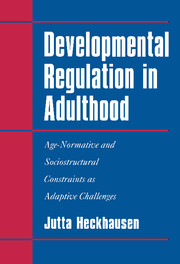 Developmental Regulation in Adulthood
Developmental Regulation in Adulthood Published online by Cambridge University Press: 05 September 2009
This chapter will discuss social comparisons as prototypical strategies in developmental regulation. The adaptive nature of strategic social comparisons has been widely studied in other areas of research (see reviews in Suls & Wills 1991; Wood 1989). I shall specifically address social comparisons in the developmental context and show that they are common, powerful, and adaptive strategies in developmental regulation. Together with other strategies, such as temporal comparison with past and future developmental states (e.g., Filipp & Buch-Bartos 1994; Ryff 1991), they help to optimize developmental regulation across the life span. First, this chapter will develop a theoretical model of social comparisons in the developmental context based on the long-standing tradition in social comparison research. Second, the model will be applied to empirical research on the similarities and dissimilarities between age-normative and self-related conceptions about development in adulthood (Study 7). Subsequently, further specific propositions about self-enhancement by social comparison under conditions of threat are derived and empirically investigated in a study on perceived problems for the self and for one's age peers (Study 8). Finally, social comparison processes will be addressed directly in a diary study and investigated in terms of their specific targets, contexts, affective consequences, and interindividual differences in primary and secondary control striving (Study 9).
To save this book to your Kindle, first ensure no-reply@cambridge.org is added to your Approved Personal Document E-mail List under your Personal Document Settings on the Manage Your Content and Devices page of your Amazon account. Then enter the ‘name’ part of your Kindle email address below. Find out more about saving to your Kindle.
Note you can select to save to either the @free.kindle.com or @kindle.com variations. ‘@free.kindle.com’ emails are free but can only be saved to your device when it is connected to wi-fi. ‘@kindle.com’ emails can be delivered even when you are not connected to wi-fi, but note that service fees apply.
Find out more about the Kindle Personal Document Service.
To save content items to your account, please confirm that you agree to abide by our usage policies. If this is the first time you use this feature, you will be asked to authorise Cambridge Core to connect with your account. Find out more about saving content to Dropbox.
To save content items to your account, please confirm that you agree to abide by our usage policies. If this is the first time you use this feature, you will be asked to authorise Cambridge Core to connect with your account. Find out more about saving content to Google Drive.